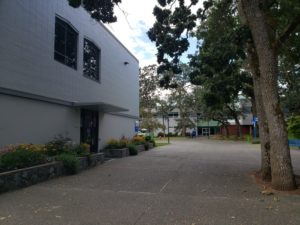Camosun College is taking a new approach in its Counselling department in September, and it hopes that students will benefit from the changes. The department is implementing a responsive access model for its services; the model is based on the stepped-care model originally developed for primary health care and is being used by post-secondary institutions across North America, including the University of Victoria. By shortening appointments and follow-up appointments, the college hopes the model—which was brought in after a 2019 external review of the department highlighted a backlog of students trying to use its services—will increase access, flexibility, and effectiveness of service delivery. (The department will also have more counsellors in the fall, which will help with seeing more students.)
Camosun Counselling chair Liisa Robinson says that when a counsellor can see a student the day they want help, it can often be more useful as they talk to students on a day they’re ready for change; a long wait can sometimes impact this. She also says that this new model should decrease the no-show rate for appointments. Robinson says that wait times in the past have been anywhere from one to four weeks, but with the responsive access model, the department is aiming to see the students on the same day they phone for an appointment.
“We will work a little bit more like a drop-in model,” says Robinson. “So the responsive access is, you would call at nine o’clock in the morning on the given day you wanted to be seen, and, in all likelihood, if we’ve planned this well, you would be able to be seen the same day, [or] at the latest, the following day.”
Initial appointments under the new model will be 45 minutes long, and follow-up times will range from 15 to 45 minutes, depending on what needs to be discussed, says Robinson. Previously, appointments were generally 50 to 60 minutes. The point is to have appointments sooner; in addictions counselling, for example, Robinson will sometimes check in with a client the very next day for a follow-up, because in the world of mental health, a day can be a long time.

“It may be that we can make it so that you start to feel better a lot sooner,” she says, “so I’m hoping that the depth of intervention that will be needed by most students won’t actually be as intense because we’ll see people soon, and it starts to get more into prevention.”
Robinson says that the new Student Services fee, which the college board of governors approved in February, likely means that the department will be able to offer more appointments.
“If that fee’s working the way it’s meant to, it should mean direct access for students [is] increased,” says Robinson. “We did a pilot of this at Interurban in January of last year, so before COVID hit. We had a chance to experience what it was like; what it meant was, in January we started fresh. Everybody that called each day, we did our best to get in that day, and for very few students, that didn’t work.”
From a clinical point of view, the making of the call or the showing up at the office indicates some readiness and urgency, says Robinson.
“Something is going on in your life—it’s like, ‘I need to deal with this today.’ And what I found with our old model is, if you have an appointment three weeks in the future, not only might your readiness shift, but things may have gotten more difficult for you in that time because you’re dealing with the impacts of mental-health challenges,” she says.
Robinson says one negative aspect to having remote appointments in the COVID-19 era is that some people don’t have access to a quiet and confidential space, sometimes due to socioeconomic factors; the college is looking into whether it’s possible to safely provide a space for remote appointments on campus where students can log in using Camosun’s internet services.
“Counselling is relational,” says Robinson, “and so the ability to see someone’s face, and hear the tone of their voice without the muffling of a mask is pretty important in the work.”
All appointments are currently being done remotely and can be booked by calling 250-370-3571 or 250-370-4925 from 9 am to 4 pm Monday to Friday.

Hello!
Are there any courses on the campus this fall or on line?